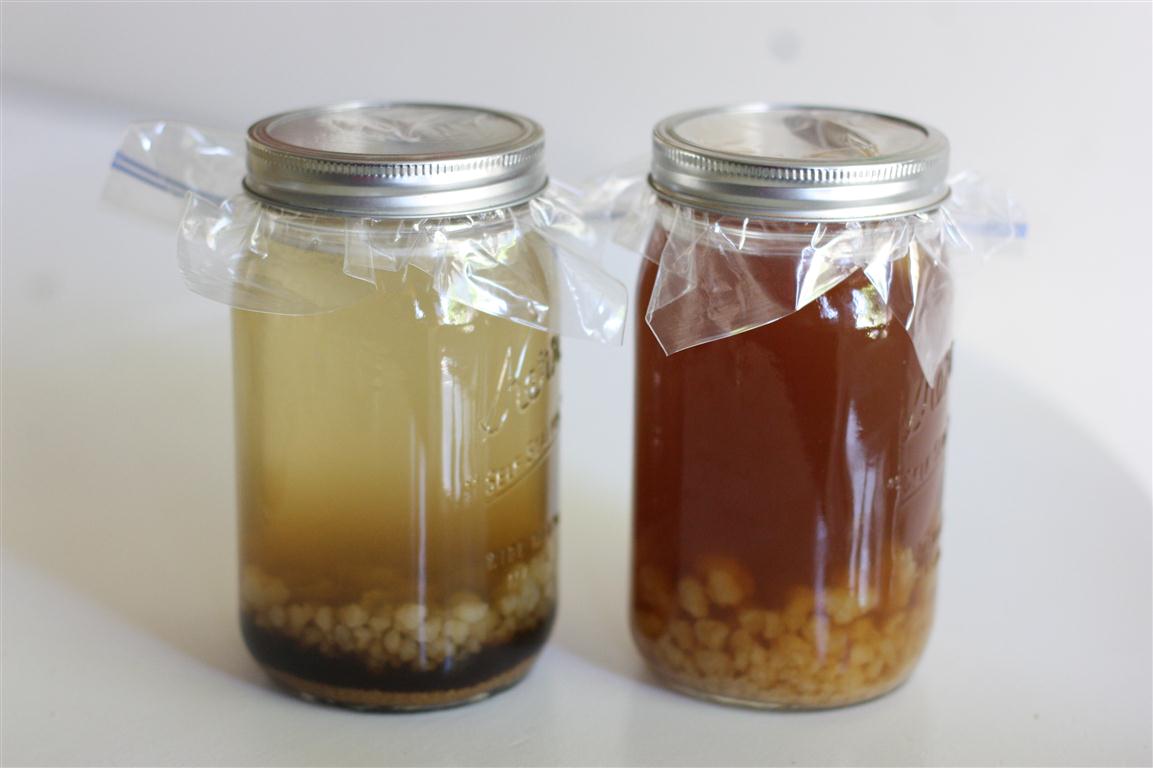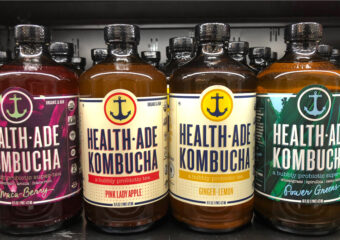Water Kefir and Kombucha – Exploring the Key Contrasts
When diving into the world of probiotic beverages, two options that often come into the spotlight are water kefir and kombucha. While these drinks may seem similar at first glance, there are some important differences in their production, flavors, and nutritional content that set them apart. Let’s take a closer look at these two fizzy, healthy beverages to help guide you in choosing the right one for your routine.
Both water kefir and kombucha are fermented beverages made from a combination of bacteria and yeast cultures. In the case of water kefir, the fermentation process involves water kefir grains, while kombucha is made with a SCOBY, or symbiotic colony of bacteria and yeast. The fermentation process for water kefir is typically much quicker than that of kombucha, taking only a day or two, whereas kombucha can take up to a week or more to ferment fully.
Distinguishing the Fermentation Process
Water kefir is made by fermenting sugar water with water kefir grains, which are a combination of bacteria and yeast that form a scoby (symbiotic culture of bacteria and yeast). The grains are small, translucent, and jelly-like in texture. They are added to a sugar-water mixture and left to ferment for roughly 24-48 hours. During this time, the grains consume the sugar, producing a slightly tart and slightly sweet drink that is packed with beneficial probiotics.
Kombucha, on the other hand, is made by fermenting sweetened tea – usually black or green tea – with a scoby, which is a thick, rubbery mat made of bacteria and yeast. The scoby floats on top of the tea while the fermentation process takes place, which can take around 7-14 days. The end result is a tangy, slightly sour drink with a vinegar-like taste that is also full of beneficial bacteria and digestive enzymes.
While the fermentation process for both water kefir and kombucha is relatively simple, the key difference lies in the ingredients used and the overall fermentation time. Water kefir tends to ferment much faster than kombucha, making it a quicker option if you’re looking to enjoy a probiotic-rich beverage in a shorter amount of time. Additionally, water kefir is naturally sweeter than kombucha, which may appeal to those who prefer a sweeter flavor profile.
Taste and Flavor Comparison
When it comes to taste and flavor, water kefir and kombucha offer a unique experience that sets them apart from each other. While both are naturally fermented beverages, they have distinct characteristics that appeal to different taste preferences.
Kombucha:
Kombucha is known for its tangy and slightly acidic taste. The fermentation process creates a tart and slightly sweet flavor profile that is enhanced by the presence of acetic acid, which gives kombucha its characteristic tanginess. The addition of black tea to the fermentation process also adds depth to the flavor, resulting in a rich and full-bodied taste. Some kombucha varieties may contain caffeine due to the black tea base, making it a popular choice for those looking for a caffeinated beverage.
Water Kefir:
On the other hand, water kefir is generally sweeter and milder in taste compared to kombucha. The fermentation process of water kefir results in a beverage that is lighter and more refreshing, with a sweet yet tangy flavor profile. Water kefir is often described as having a fresher and fruitier taste, making it a favorite among those who prefer a sweeter beverage. Additionally, water kefir is typically caffeine-free, making it suitable for those looking for a caffeine-free alternative.
In conclusion, the taste and flavor of water kefir and kombucha differ significantly, with kombucha being more tart and tangy, while water kefir is sweeter and more refreshing. Understanding the differences in taste can help you decide which fermented beverage is better suited to your palate and preferences.
Nutritional Values and Health Benefits
When it comes to the nutritional values and health benefits of water kefir and kombucha, both beverages offer a range of advantages. Let’s take a closer look at what makes these fermented drinks a good option for your health.
Water kefir is a probiotic-rich beverage that contains a variety of beneficial bacteria strains. These bacteria help improve digestive health, boost the immune system, and promote overall well-being. Additionally, water kefir is low in calories and sugar, making it a great option for those looking to maintain a healthy diet.
On the other hand, kombucha is made through a fermentation process that involves a colony of bacteria and yeast. This process produces acetic acid, which is known for its health benefits. Kombucha is also rich in probiotics, which can help improve digestion and gut health. Moreover, kombucha contains antioxidants that can help protect the body from damage caused by free radicals.
Although both water kefir and kombucha offer valuable nutrition and health benefits, the choice between the two ultimately comes down to personal preference. Some people prefer the mild sweetness and sparkling texture of water kefir, while others enjoy the tangy flavor and fizzy nature of kombucha. It’s important to experiment with both beverages to see which one you prefer and which one works best for your health goals.
Water Kefir vs. Kombucha: Understanding the Key Differences
When it comes to fermented beverages, water kefir and kombucha are two popular options that many people enjoy, especially during the summer months. Both beverages are known for their fizzy, tangy flavors and are packed with probiotics, making them a great addition to your routine.
While water kefir and kombucha are similar in many ways, there are some key differences between them that are important to consider before you decide which one to make at home. Let’s take a closer look at the production process, flavor profile, and nutritional content of these two fermented drinks.
Production Process: Water kefir is made by fermenting water with kefir grains, which are small, gelatinous colonies of bacteria and yeast. Kombucha, on the other hand, is made by fermenting sweetened tea with a SCOBY (symbiotic culture of bacteria and yeast). The fermentation process for water kefir is usually faster than kombucha, with water kefir typically taking 24-48 hours to ferment, while kombucha can take 7-14 days.
Flavor Profile: Water kefir has a milder flavor compared to kombucha, with a slightly sweet and tart taste. Kombucha, on the other hand, has a more robust flavor profile, with a tangy, slightly acidic taste. The flavor of both beverages can vary depending on the ingredients used and the length of fermentation.
Nutritional Content: Both water kefir and kombucha are rich in probiotics, which are beneficial bacteria that support gut health. Water kefir is lower in acetic acid than kombucha, making it a sweeter and milder option. Kombucha, on the other hand, is known for its higher acetic acid content, which gives it a more tart flavor.
Overall, both water kefir and kombucha are great options for adding fermented beverages to your routine. Whether you prefer the milder, sparkling taste of water kefir or the tangy kick of kombucha, both drinks offer a delicious way to enjoy the benefits of probiotics. So, why not give them a try and see which one you like best?
Comparing Water Kefir and Kombucha
Water kefir and kombucha are both popular fermented beverages that offer a variety of health benefits. While they share some similarities in terms of production process and probiotic content, there are also key differences that set them apart. Understanding these differences can help you choose the beverage that best suits your preferences and health goals.
Production Process
Both water kefir and kombucha are made through a fermentation process that involves the use of bacteria and yeast cultures. However, the specific cultures and fermentation process differ between the two beverages.
| Water Kefir | Kombucha |
| Water kefir is typically made from water kefir grains, which consist of bacteria and yeast cultures. | Kombucha is made from a SCOBY (symbiotic culture of bacteria and yeast) that ferments in sweetened tea. |
| The fermentation process for water kefir usually takes 24-48 hours, depending on the temperature and desired level of sweetness. | Kombucha ferments for a longer period, usually around 7-14 days, which results in a tangy flavor. |
Overall, the production process for water kefir is quicker and results in a more neutral flavor profile, while kombucha fermentation takes longer and produces a more tangy and vinegar-like taste.
Nutritional Content and Health Benefits
Both water kefir and kombucha are rich in probiotics, which are beneficial bacteria that support gut health. They also contain vitamins and minerals that are produced during the fermentation process.
Water kefir is typically lower in acetic acid than kombucha, making it a great option for those looking for a milder, less tart beverage. Kombucha, on the other hand, has a higher acetic acid content, giving it a stronger flavor profile.
Depending on the specifics of the fermentation process and flavorings used, water kefir and kombucha can offer slightly different nutritional profiles. Some commercial options may be flavored with fruits or herbs, adding additional nutrients and flavor complexity.
In conclusion, both water kefir and kombucha are healthy, probiotic-rich beverages with unique flavors and health benefits. Choosing between the two will depend on your taste preferences, desired flavor profile, and nutritional goals.






